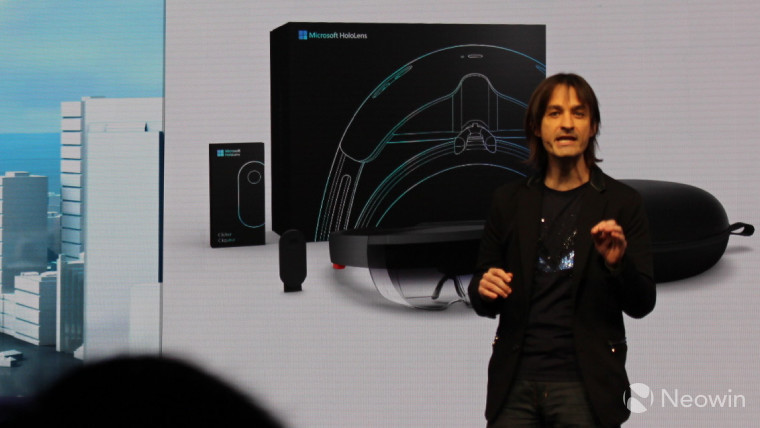
Last week, Microsoft's Roger Walkden revealed that the company has sold "thousands" of its HoloLens headsets since launching the $3,000 Development Edition last year. Given the high price and narrow focus of the product - targeting developers and enterprise customers - that kind of sales volume seems pretty reasonable. HoloLens is also a largely experimental product, for Microsoft as much as for those who purchase the device.
Of course, plenty of people want to know when HoloLens will move beyond that experimental phase, and on to a wider consumer launch. That question was put to Microsoft Technical Fellow Alex Kipman, one of the key visionaries behind the device, in an interview with CNET. The answer may prove a little frustrating for some.
"In terms of consumer product," Kipman said, "I'm going to separate two things. Are there plans for this thing being a non-dev kit? Abso-freakin-lutely, of course. When? I'm not going to tell you today, but of course we have plans to become a non-dev kit. Now, once it's a non-dev kit, anybody can buy."
He elaborated further:
The better question and the better way to answer it is, at what point is this thing going to be under $1,000? Because I can say it's a consumer product tomorrow because I can remove the dev kit thing, [but] the $3,000 thing is going to get in the way of it becoming a mass market consumer product. You have to reduce the price point until it's affordable to the majority of the populous [sic] of Earth, which will be under a $1,000 and then some to get there.
Tantalizingly, he added: "Roadmaps for both of those things exist today, but I'm not going to announce or talk about it today."

But Kipman made it clear that in terms of its commercial development, Microsoft currently remains focused on how HoloLens can work in enterprise environments, for now. That will no doubt change in the future, but it sounds like Microsoft intends to maintain HoloLens as the jewel in the crown of its Windows Holographic ecosystem - and that could mean that the most affordable holo-headsets will come from the company's hardware partners. Kipman said:
HoloLens, and I think I'm consistent from the first day we introduced it, is the first self-contained holographic computer. Today it's still the only [one] but from day one I've invited anybody else that's working in this space to participate in this ecosystem with us. You see a lot of other people creating headsets. My invitation remains open to that entire ecosystem to come participate.
Last May, I went to Computex in Taipei and I formally started working with the ecosystem on it. And six months later, in October, we announced five different products from five large OEMs -- Dell, HP, Lenovo, ASUS and Acer -- that had taken HoloLens sensors with our help and created the best and the most affordable mixed-reality headsets in the market today.
So far, the Windows Holographic devices revealed by Microsoft's partners have focused exclusively on 'enclosed' virtual reality experiences, rather than the augmented reality approach of HoloLens, which overlays digital objects onto the user's real world view in real time. These manufacturers plan to offer their VR headsets at far lower prices than devices such as HTC's Vive or the Oculus Rift. Kipman explained:
Because of all of the innovation, we can make more affordable [headsets]. HoloLens will always remain our highest watermark product in the system, and we'll keep ratcheting it up to more and more realistic, awesome, intelligent, delicious things.
In much the same way that Microsoft develops and markets its Surface range, it seems the company's broad plan is to establish HoloLens as the 'showcase' device for its holographic platform as the ecosystem grows, leaving plenty of room for its partners to launch other headsets alongside it, at various price points.
Of course, there's plenty of room for speculation here, at least until the company is ready to announce its plans. But as Walkden said last week, and Kipman reiterated, Microsoft has established roadmaps for the future of HoloLens, and it's clearly only a matter of time before the technology behind the headset becomes affordable, and advanced, enough for a wider launch.
Source: CNET via MSPoweruser




















16 Comments - Add comment